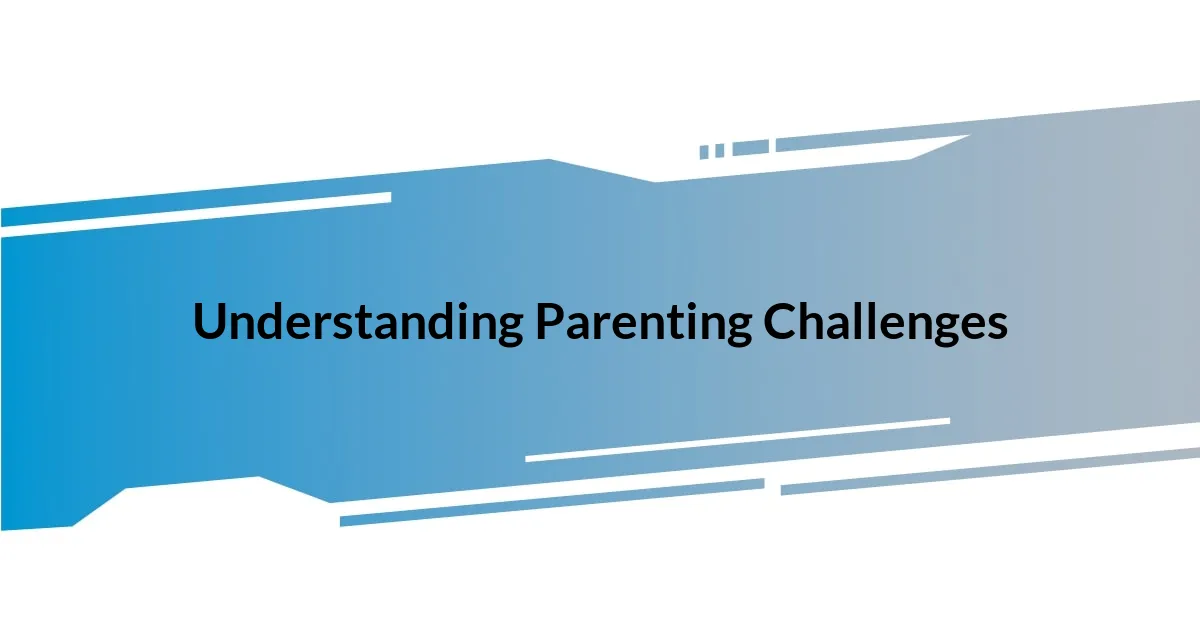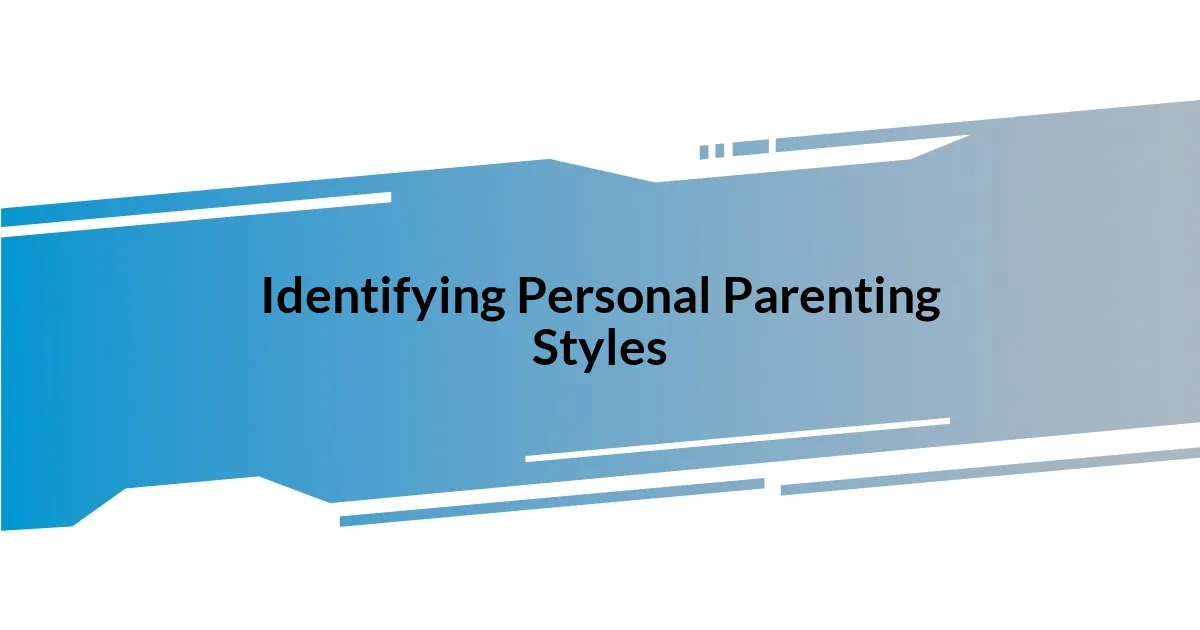Key takeaways:
- Parenting challenges are opportunities for connection, and staying calm teaches children resilience.
- Recognizing personal parenting styles—authoritative, permissive, authoritarian, uninvolved, and reflective—helps adapt instincts for better family dynamics.
- Daily routines foster security and teach responsibility, while flexibility allows for spontaneous moments of joy.
- Effective communication and positive discipline techniques empower children, nurture emotional intelligence, and promote collaboration in problem-solving.

Understanding Parenting Challenges
Parenting challenges often arise from unexpected situations that test our patience and resilience. I vividly remember a day when everything went awry—a spilled drink, a lost shoe, and my toddler throwing a tantrum in the middle of a store. It made me wonder: why is it that the simplest outings can turn into chaotic adventures?
Navigating these challenges requires a deep understanding of both myself and my children. I’ve learned to anticipate their emotional needs, especially when they’re feeling overwhelmed. Have you ever considered how a child’s emotions can mirror our own? For example, when I’m stressed, my child often feels it too, leading to a volatile mix of emotions.
One of the most profound realizations I’ve had is that challenges are not just obstacles; they’re opportunities for connection. I often reflect on how my responses shape my child’s understanding of emotions. When I find the strength to stay calm in a storm of chaos, I’m teaching them resilience—one parenting challenge at a time.

Identifying Personal Parenting Styles
Understanding my personal parenting style has been an enlightening journey. I recall trying a more hands-off approach during a particularly challenging phase with my eldest. Instead of jumping in to solve problems, I let him navigate some frustrations with his toys. Initially, it was excruciating to watch, but in those moments, I discovered the empowerment that comes from stepping back and allowing him to figure things out on his own.
Here are a few key aspects to consider when identifying your parenting style:
- Authoritative: Balancing love and discipline, I often encourage independence while setting clear boundaries.
- Permissive: I’ve noticed tendencies to give in to my children’s desires, especially when I’m tired or overwhelmed.
- Authoritarian: There are times when I’m strict, driven by my need for control during unpredictable days.
- Uninvolved: I catch myself sometimes when my focus drifts, which reminds me of the importance of being present.
- Reflective: I regularly take a step back to evaluate how my childhood influences my parenting choices.
Recognizing these styles helps me understand my instincts and adapt to what truly works for my family. It’s all about patience with myself and being open to change.

Developing Daily Routines
Developing a daily routine has been a game changer in my approach to parenting. I started simple—designating “homework hour” after school. Initially chaotic, I soon discovered that setting aside this time created predictability, which calmed my kids and made transitions smoother. There’s something comforting about a familiar schedule; it invites a sense of security for both them and me.
As I tweaked our routines, I realized how beneficial they were for teaching responsibility. For instance, I assigned each child a specific chore to complete before dinner. I remember my youngest’s pride when he managed to set the table all by himself for the first time. This built his confidence and lightened my load—proof that routines can empower children to take on small responsibilities.
While daily routines bring structure, I’ve learned to keep them flexible. The other day, we had a planned movie night, but my kids were full of energy. Instead of insisting on the routine, we embraced a spontaneous dance party. It reminded me that sometimes the best moments arise from breaking the mold. Balancing structure with spontaneity keeps us all engaged and happy.
| Type of Routine | Example from Daily Life |
|---|---|
| Morning Routine | Wake up, have breakfast together, and set the day’s goals. |
| Homework Hour | Designated time after school for assignments, creating a calm environment. |
| Chore Assignment | Each child is responsible for specific chores before dinner. |
| Flexible Activities | Scheduled movie night can transform into a dance party based on mood. |

Implementing Effective Communication
Effective communication has been a pillar in my parenting journey. I recall a moment when my daughter came home upset from school. Instead of dismissing her feelings, I sat down and asked open-ended questions about her day. This not only signaled to her that her emotions mattered but also encouraged her to articulate her thoughts. Isn’t it amazing how a simple conversation can strengthen your bond with a child?
I’ve learned to actively listen, really tuning in to what my kids express. When my son struggles with math homework, I resist the urge to jump in and solve the problem right away. Instead, I ask him to explain what he finds confusing. By doing this, I not only empower him to think critically but also gain insight into his thought process. It’s rewarding to watch him connect the dots and feel proud of his accomplishments.
Celebrating small wins during our conversations has become a heartwarming habit. I remember the excitement in my voice when my youngest shared his perspective on a tricky social situation with a friend. I emphasized his thinking and gave him praise, which boosted his confidence. But isn’t it crucial to remind ourselves that our encouragement fuels their growth? Each conversation becomes a stepping stone towards their independence and self-assurance.

Applying Positive Discipline Techniques
Applying positive discipline techniques has truly transformed my approach to handling my children’s behavior. I recall a time when my daughter threw a fit over her toy being taken away. Instead of resorting to a punishment, I guided her through understanding why sharing is essential, using gentle reminders and real-life examples. I often wonder how effective a simple discussion can be in shaping their decision-making, rather than merely imposing consequences.
One technique that’s worked wonders is using encouraging language instead of reprimands. When my son was acting out during family game night, I turned his attention by saying, “I really appreciate when you wait your turn. It shows such great sportsmanship!” It’s fascinating to see how positive reinforcement not only calms the situation but fosters an environment of respect and cooperation. I believe that focusing on the behavior I want to encourage instead of the behavior I want to change is a pivotal shift that benefits us all.
Additionally, I find it incredibly rewarding to involve my children in the problem-solving process. The other day, we faced the classic scenario of sibling rivalry over space in their play area. Instead of arbitrating, I sat down with them and asked, “How do you think we can share this space better?” They surprised me with creative solutions, which not only resolved the issue but also empowered them to collaborate. Don’t you think providing children with a voice in problem-solving nurtures their emotional intelligence? Ultimately, these moments are opportunities for growth, both for them and for me as a parent.

Building a Support Network
Building a support network is essential in my parenting journey. When I faced challenges, I reached out to fellow parents, realizing the strength that comes from shared experiences. It’s comforting to know I’m not alone, and conversations often lead to solutions I hadn’t considered. Don’t you find it enlightening how others’ perspectives can reshape our own understanding?
I remember a particularly tough week when my schedule felt overwhelming, and my patience was running thin. A close friend of mine stepped in, offering to take my kids for a few hours. This small gesture provided me with the space to recharge and reflect, reminding me of the importance of asking for help. How often do we overlook the support that’s right around us?
Additionally, I’ve discovered that online communities can be just as beneficial. I participate in a parenting group where we share tips, advice, and even vent about tough days. It’s striking how virtual connections can foster real friendships and support. Have you ever thought about the power of a simple message or post bringing a sense of belonging? Each interaction contributes to a richer tapestry of support, proving that we’re all in this together.

Reflecting and Adapting Strategies
Reflecting on parenting strategies has been a significant part of my growth as a parent. Just the other day, after a challenging morning filled with tantrums, I took a moment to jot down what worked and what didn’t. I found that the days when I remain calm and patient always yield better results. Have you ever noticed how your mood can set the tone for your child’s behavior? It’s almost like a mirror, reflecting back what you project.
Adapting my approach is something I practice regularly. For instance, I used to dread homework time, as it often led to tears and frustration. After some reflection, I decided to change our homework routine by integrating play. We now turn math problems into games, and it genuinely makes a difference. I sometimes wonder what small tweaks we can make to transform our daily battles into bonding moments.
One of my ongoing challenges involves setting boundaries, which requires constant reevaluation. I recall a time when my son consistently pushed bedtime limits, testing my patience. Instead of laying down strict rules, I asked him to help create a bedtime chart, outlining his responsibilities. Surprisingly, he embraced the idea, feeling a sense of ownership. Isn’t it amazing how involving kids in decisions fosters respect? Reflecting on such situations helps me adapt and turn challenges into growth opportunities.